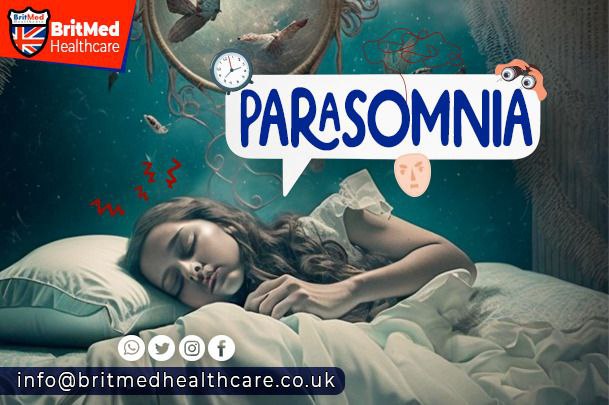Parasomnia: what is it?
An irregular pattern of movements or behaviors occurring either while asleep or during the transition between sleep and waking is known as parasomnia. Different factors, such as one’s physical and mental health, as well as one’s sleep environment and behaviors, might contribute to the development of this sleep disorder.
Parasomnia Signs and Symptoms
Parasomnia can manifest in a variety of ways, but typical signs of the disorder Include:
-Unusual limb motions, speech, or other movements while sleeping
-Paralysis during sleep
-Nightmare disorder
-Night terror disorder
-Sleep eating
-Sleep drinking
-Sleep talking
-Sleepwalking
-Sleep-related eating disorder
-Sleep-related movement disorder
Many Parasitic Conditions
Some of the most prevalent forms of insomnia are:
Somnambulism, sometimes known as sleepwalking, is the most prevalent kind of parasomnia. In this condition, the affected individual stands up and moves around while they are still asleep.
The term “somniloquy” describes the phenomenon of unconscious speech while sleeping.
Parasomnia disorder known as sleep-related eating disorder: a condition in which an individual eats while asleep without being aware of it.
Parasomnia with a focus on sleep: this condition is characterized by involuntary alcohol consumption while one is asleep.
-Roaring arms and legs during sleeping are symptoms of sleep-related movement disorder.
-Sleep paralysis: during falling asleep or in the early stages of waking up, a person is unable to move or talk.
-Nightmare disorder: recurring nightmares that are both horrific and difficult to bear.
-Anxieties at their worst during the night is a symptom of nocturnal terror disorders
What Causes Sleeplessness?
No one knows for sure what causes parasomnia. But they might also contain:
Medical issues, such as sleep disorders (such as slumber apnea, insomnia, or restless leg syndrome)
Depression and anxiety disorders are examples of mental health issues. Things to consider when sleeping, including temperature, light, and noise This illness could be brought on by irregular sleep patterns, particularly insufficient sleep, as well as a genetic tendency. Resolving Sleep Disorders
The severity and kind of parasomnia one is experiencing determine the best course of treatment.
Mental health counseling and therapy to address root causes
Medications prescribed by a doctor to control the irregularities in sleep and alleviate parasomnia symptoms.
Changes to one’s routine, such as establishing a regular bedtime and cutting out stimulating activities in the hours leading up to your sleep.
Breathing exercises and other forms of progressive muscle relaxation.
In summary,
Parasomnia is a cluster of sleep problems that can significantly diminish one’s standard of living. Although the root causes have not been identified, there are a number of therapy alternatives that can alleviate the symptoms.
If you have any unusual or distressing symptoms while you sleep, it is recommended that you seek medical advice.
Hashtags:
#Parasomnia
#SleepDisorders
#BritmedHealthcare
#NightingaleHospital
#TopDoctorsUK
Additional Resources
For more information on parasomnia and other sleep disorders, please visit:
Britmed Healthcare:https://britmedhealthcare.co.uk/blog/
Nightingale Hospital: https://www.nightingalehospital.co.uk/
Top Doctors: https://www.topdoctors.co.uk/doctor/ahmed-el-missiry
Contact us on WhatsApp: 08009708017
References:




